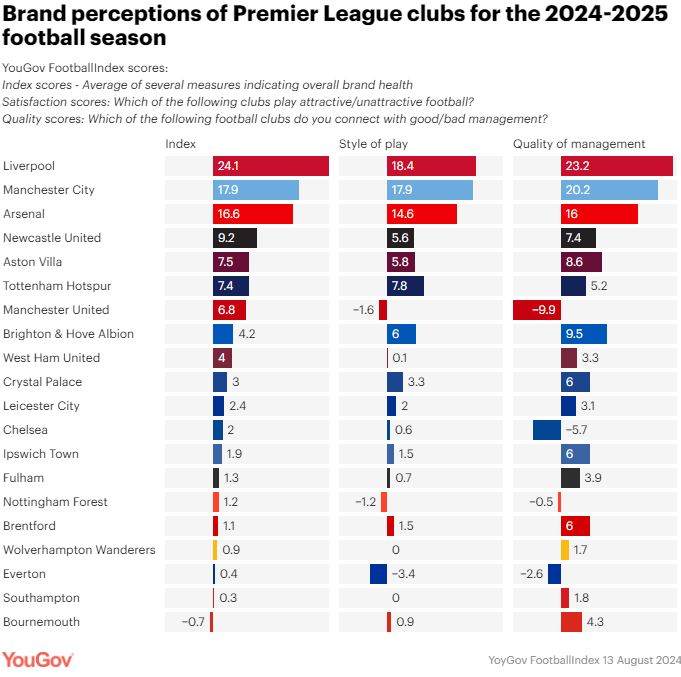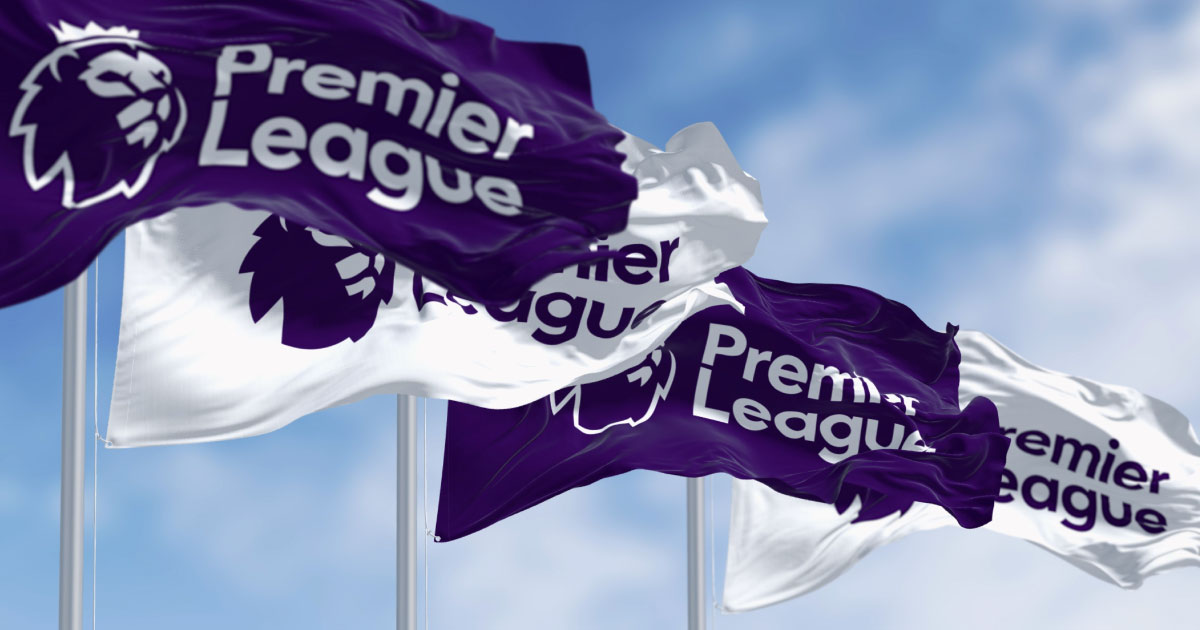With the 2024-2025 Premier League season beginning this weekend, it’s the perfect time to check in on public perceptions of the 20 clubs that now constitute the top tier of the English men’s game. YouGov FootballIndex tracks opinion across several different measures, including – but not limited to – a club’s overall brand health, its style of play, and the quality of its management.
In terms of overall brand health, its Liverpool (24.1), who won the Carabao Cup but lost their manager last season, who currently come out on top. They are followed by Manchester City (17.9), who ended the 2023-2024 campaign with their fourth Premier League title in a row. Arsenal (16.6), runners-up to the Sky Blues in a close-run title race, come in third, while Newcastle – seventh in 2023-2024 after claiming a Champion’s League spot in the previous season – rank fourth. Manchester United, who this time two years ago were in second spot for overall brand health, have fallen to seventh in this pre-season snapshot. Nevertheless, they comfortably beat Chelsea who occupy twelfth position for brand health. Aston Villa, perhaps riding high on a season that saw them qualify for the Champions League, are another team who break up the “Big Six” hegemony when it comes to brand health.

Style of play is another key consideration for many fans, so let’s take a look at which Premier League clubs are perceived to play the best football. Again, Liverpool – whose “heavy metal” football under Jürgen Klopp won them European and domestic titles – claim top spot (18.4); it will be interesting to see if new manager Arne Slot can maintain this position or improve it further. Manchester City, whose emphasis on possession and control under Pep Guardiola has received praise and criticism (and inspired its share of imitators), come in second (17.9), with Arsenal – led by Pep acolyte Mikel Arteta – ranking third (14.6). Gunners fans may be somewhat pleased that they come ahead of fourth-ranked Tottenham Hotspur (7.8), with almost double Spurs’ score.
Exploring quality of management – which here refers to stewardship at all levels of the club’s hierarchy, not just the team itself – shows that Liverpool once more take first place (23.2). John Henry’s recent affirmation that he has no intention of selling the club could therefore come as something of a relief to fans.
Manchester City again rank second (20.2) – perhaps largely thanks to Guardiola’s continued success last season and the signing of players like Savinho ahead of the new campaign. With an independent commission set to rule on the 115 charges facing the club in mid-September, could this change dramatically before the season is through? Arsenal complete the top three (16.0), followed by Brighton & Hove Albion (9.5) in fourth place. The south coast club has been lauded for its smarts in the transfer market, as well as performances on the pitch. For perhaps the same reasons, Brentford also perform well against this metric, with its score of 6.0 matched by Crystal Palace and one this year’s returnees, Ipswich.
Outside of the top performers, Manchester United – despite beating crosstown rivals Manchester City in the FA Cup Final – present a curious case of a club with a strong brand (6.8), but poor perceptions of their footballing style (-1.6) and quality of management (-9.9). This may be due to ongoing discontent with the Glazers: YouGov polling conducted in June revealed that three in five United fans (61%) who were unhappy with the club’s performance over 2023-2024 blamed the owners “a great deal”.
Premier League 2024-2025: Which clubs have the best brands and play the nicest football?
With the 2024-2025 Premier League season beginning this weekend, it’s the perfect time to check in on public perceptions of the 20 clubs that now constitute the top tier of the English men’s game. YouGov FootballIndex tracks opinion across several different measures, including – but not limited to – a club’s overall brand health, its style of play, and the quality of its management. In terms of overall brand health, its Liverpool (24.1), who won the Carabao Cup but lost their manager



